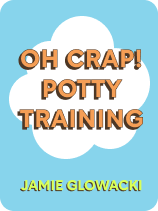

This article is an excerpt from the Shortform book guide to "Oh Crap! Potty Training" by Jamie Glowacki. Shortform has the world's best summaries and analyses of books you should be reading.
Like this article? Sign up for a free trial here .
What are the three C’s to keep in mind when potty training your child? Why are these tenets crucial for successful potty training?
Throughout the book Oh Crap! Potty Training, Jamie Glowacki emphasizes three main tenets for successful potty training. The success of Glowacki’s potty training depends on these tenets, so you should understand them before beginning to potty-train your child.
Keep reading for more on Jamie Glowacki’s potty training tenets: clarity, consistency, and confidence.
Tenet #1: Clarity
Jamie Glowacki’s potty training advice starts with clarity. In the context of potty training, clarity means you’re clear to your child about what you need them to do—you’re firm but supportive and don’t offer your child the chance to say no. Clear instructions help your child understand what’s expected of them, making it easier to follow your instructions and learn. On the other hand, if you aren’t clear about what you want, your child will feel confused, anxious, or frustrated—feelings that derail potty training by encouraging resistance, power struggles, and tantrums.
Throughout potty training, communicate exactly what you need your child to do, without phrasing these instructions in the form of a question or option.
- For example, instead of saying, “Do you need to pee? Do you want to pee in the toilet?” say, “Let’s go to the toilet so you can try to pee.”
(Shortform note: While Glowacki mainly discusses clarity in the context of how you can make your instructions clear to your child, psychological research suggests that truly effective clarity between a parent and child must go both ways. That is, besides communicating what you need, you must work to understand what your child needs from you. To encourage your child to express their needs, experts recommend you demonstrate you’re listening by making eye contact and getting down on their level while communicating.)
No Rewards
Clarity is also why Glowacki argues against using rewards for potty training. The main goal of potty training, she explains, is teaching your child that consistent potty use is expected behavior. A reward system, on the other hand, teaches your child to use the potty only as long as they get something out of it. This lesson conflicts with your main goal, sending mixed messages to your child.
(Shortform note: Some experts disagree with the idea that reward systems don’t encourage behavior in itself. They argue that when you make clear and consistent rules about when and why your child can earn rewards, they will associate the positive feeling of being rewarded with the behavior (in this case, toilet use) itself. In addition, they explain that rewards also help your child form new habits—eventually, they’ll start using the toilet out of habit rather than because of a reward.)
Tenet #2: Consistency
Glowacki emphasizes that consistency is crucial for making the process of potty training clear and simple. Consistency means committing time and energy to training your child until it’s done. Training your child consistently allows them to keep practicing toilet use, making it routine. On the other hand, inconsistency—for example, putting your child in diapers when you don’t feel up to training—means your child won’t pick up these skills as quickly and might find your instructions unclear or conflicting. (Shortform note: Research supports Glowacki’s claim that consistency helps your child learn, and further suggests that inconsistent parenting methods—such as disciplining your child in some instances of a behavior but not other instances—often contribute to misbehavior in toddlers.)
To be consistent in your potty training, keep your instructions the same and make them part of a daily routine—Glowacki explains that toddlers love routines because they provide structure and a sense of certainty. She emphasizes that you should not give up or return to diapers for convenience’s sake—even if you were to do so only once a week, these exceptions teach your child that you don’t expect them to always use the toilet.
(Shortform note: You might be wondering what kinds of potty training routines you should create. Some experts recommend planning specific moments in the day when your child will use the potty. Plan to put your child on the potty for a few minutes every two hours, and attach potty use to specific activities, like bedtime. However, note that planning potty training this rigidly contrasts with the more situational approach we’ll see in our discussion of Glowacki’s potty training phases.)
Tenet #3: Confidence
Being confident in yourself is crucial for sending your child clear and consistent messages about what you need from them. Glowacki explains that toddlers pick up on emotional cues in body language and mimic them. Therefore, by speaking and acting with confidence, you’ll help your child feel confident as well. (Shortform note: Psychological research supports Glowacki’s claim that toddlers mimic the emotions of others, and even suggests children under twelve months old can do so.)
Confidence also keeps potty training clear and consistent. If you feel uncertain, your child will receive unclear and inconsistent instructions: Your voice might say they have to do something, but your body language will show that you’re unsure. On the other hand, speaking and acting with confidence means that your voice and body language send the same message. Finally, if you’re confident in your approach, you’ll naturally have an easier time committing to it, helping with consistency.
| Boost Your Parental Confidence To keep up your confidence during the often challenging process of potty training, try using these three expert-recommended methods: 1) Don’t abandon hobbies: Try to spend some time on skills or hobbies you’re confident in. Doing so will provide a nice break from parenting stress, and remind you that you’re a skilled and capable adult. 2) Positive self-talk: Boost your confidence by making your inner monologue positive, reminding yourself of everything you’ve already accomplished as a parent and everything you’re capable of accomplishing in the future. 3) Manage advice you receive: Being a parent often means receiving a lot of advice from a lot of people. To stay confident in your parenting, change the subject away from unwanted advice if you feel overwhelmed. |

———End of Preview———
Like what you just read? Read the rest of the world's best book summary and analysis of Jamie Glowacki's "Oh Crap! Potty Training" at Shortform .
Here's what you'll find in our full Oh Crap! Potty Training summary :
- How to practice the Oh Crap! Potty Training method
- How to overcome a number of potty training challenges
- What to do if you need to restart the potty training process






